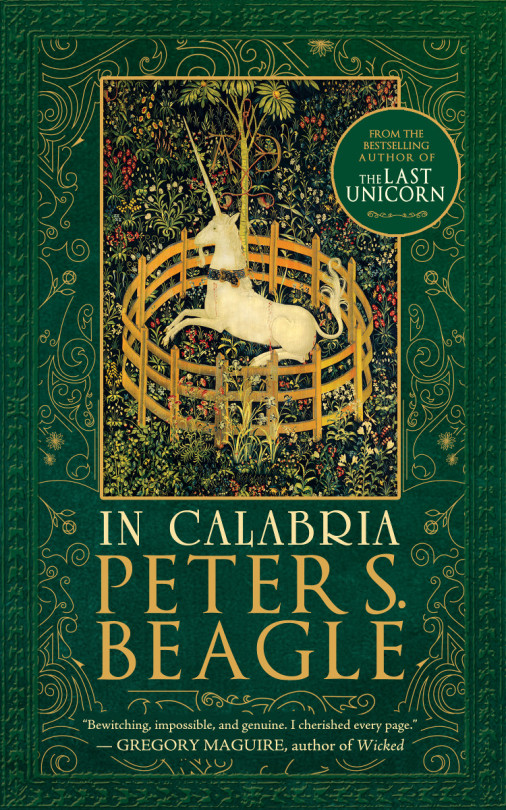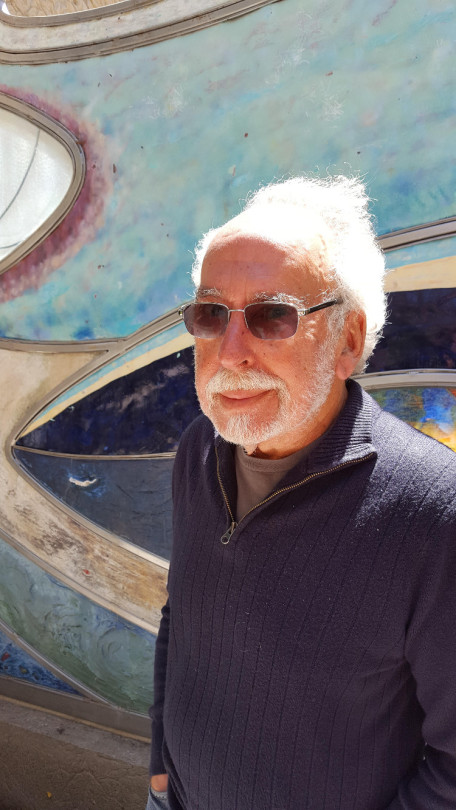Peter S. Beagle’s IN CALABRIA inspires you to believe the impossible
A quartet of fresh reviews for Peter S. Beagle’s lovely IN CALABRIA.

S. Kay Nash of BUZZY MAGAZINE praises the book.

When Peter S. Beagle’s name shares a cover with a picture of a unicorn, it’s easy to make assumptions. Let me assure you that IN CALABRIA is nothing at all like THE LAST UNICORN. Though it features the same creature, this story is not a fairy tale. It’s a journey of discovery and redemption with just enough magic to inspire you to believe the impossible.
<snip>
Unicorns are the bearers of fable and allegory, and Beagle weaves myth and magic into the story with a deft hand. His prose is lyrical, and to rush through the book is to do it an injustice. Avid readers may finish it in a day or two, but it invites re-reading to find gems of prose, imagery, or nuance that slipped past on the first read.
IN CALABRIA is a place where ancient myth and the chaotic modern world meet with the kind of idyllic European countryside that exists only in daydreams. Where these paths cross, magic passes by, leaving love and hope it its wake.
At DUELING LIBRARIANS, Cyndi and Renee enjoy the story.
CYNDI:
IN CALABRIA is a sweet tale that examines the psyche of modern people and how they would react to fantastical things. Would they stare in wonder and revere it, or would they seek to control and harm it?
RENEE:
If you read Peter S. Beagle’s IN CALABRIA, prepare to end up with a very different tale than you think you are starting out with. After the initial few pages, I was under the distinct impression that this would only be an allegorical tale in the vein of Paulo Coelho’s THE ALCHEMIST (much to my chagrin, as I mostly hated THE ALCHEMIST). However, this changed quickly. While there were still aspects of a parable throughout the novel, by the end the tone was much different. Beagle has created something that is yes, part parable. But it is also part folk tale, love story, a discourse about what life is truly about, and a discussion on what makes an individual a demonstrably good human being.
<snip>
CYNDI:
As with any good novel, Beagle keeps you guessing. From the moment I started reading until the very last page, I didn’t know what to expect. A languid tale,IN CALABRIA floats the reader down a river of philosophy, myth, bravery, love, and art. The unicorn’s appearance changes those who interact with her, awakening aspects of their character they didn’t know existed.
Whimsical from the get-go, Beagle weaves a magical story, his lyrical prose dancing across the page. At points, I could smell the crisp fall mornings. Feel the dew-damp grass. Run my fingers across the soft ground marred with cloven prints.
I loved this sleepy novel. I loved the characters, the mood, the premise. My only issue with the book had to do with me, not the writing. From the very outset, I found myself wishing I’d taken Italian in college instead of French.
RENEE:
I truly enjoyed the expressive writing in the novel, which walked that ever-so-subtle line between “trying too hard” and “not trying hard enough.” Beagle is excellent at stating a lot, poetically, with very few words. He is also masterful at creating strong characters in mere sentences. Within a few paragraphs, the reader has a distinct impression of what kind of individual Claudio is and how he interacts with the both the physical world and the people around him. A similar effect happened with all of the side characters – no matter how inconsequential they were, no matter how short an interaction the reader encountered with them – the encounter left no doubt as to what kind of individual the reader was meeting. This level of writing – well, I can only put it down to the decades of writing experience Beagle has under his belt.
For me, there were two things that were the most intriguing aspects of the book. The first was the exploration of what makes a person worthy or good. We see the reaction of various characters as they encounter the unicorn, or rumors of the unicorn. Without drawing any conclusions for the reader, Beagle paints a picture of different layers of humanity, just from this one factor. The second aspect – hardly touched on at all, in fact – was the nature of time. I am a sucker for books that make me think of time and space in new and fun ways, and without giving away too many plot points, Beagle has raised just enough intriguing questions to pique my curiosity for this mini-world he created.
IN CALABRIA was perfectly what it was – a somewhat allegorical novel with enough nitty gritty detail to keep it from devolving heavily into a completely philosophical tale. He managed to communicate a panoply of emotions without being overly dramatic, and managed to convey right and wrong without a bunch of pretentious moralizing. With In Calabria, Beagle has stripped away all excess, leaving the bare bones of a good story, and one that I would heartily recommend.

Photo: Rina Weisman
ALLISON’S ADVENTURES
INTO WONDERLANDS lauds the volume.
I was pleasantly surprised by this book. It was short (a mere 176 pages), but it packed a punch.
<snip>
I also enjoyed the fact that, while a seemingly simple story on the surface, there were deep undertones relaying messages of love, loss, and loneliness. The unicorn herself, who Bianchi dubbed “La Signora” out of respect, was herself a metaphor for what Bianchi himself had lost. It was never overly poignant or profound in the way that A Man Called Ove was, but it was deep and meaningful in a more subtle way.
Overall, I did enjoy this book – a lot more than I expected I would. I never read any of Beagle’s other works, though SUMMERLONG has been on my TBR list for a while now.
John Ottinger III for WORLD MAGAZINE reviews IN CALABRIA.
For Italian farmer and poet Claudio Bianchi, solitude and unvarying routine are his greatest desires. Yet when a unicorn suddenly appears almost on his doorstep, Claudio falls in love with her beauty. When a mobster tries to make the beautiful unicorn serve his own wants and needs, Bianchi defends the unicorn, learning that to love is to sacrifice and that beauty is found in communion with others. This novel shows that beauty is more than an idea. Christians understand beauty is made real in Jesus Christ, who often arrives without warning and with unforeseen consequences.
For more info about IN CALABRIA, visit the Tachyon page.
Cover design by Elizabeth Story
